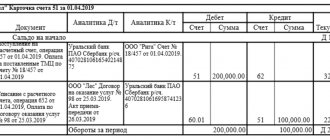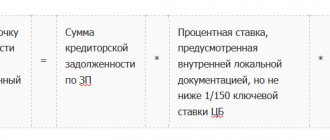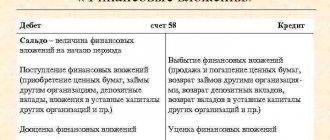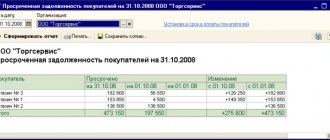Source: Accounting. Taxes. Right
The bone of contention: how to reflect in accounting the employee’s return of overpaid wages. Why is this important: incorrect reflection of a transaction can lead to a gross violation of the rules for accounting for income and expenses. And for this you face a fine under Article 120 of the Tax Code of the Russian Federation.
On the forum of the website www.audit-it.ru there was a heated discussion of the question of which entries would be more correct to reflect in accounting the return by an employee to the cash desk of an overpaid salary.
The participants were unanimous only in the way to correct erroneously accrued wages and taxes in accounting. This must be done using the reversal method. As for what kind of postings to reflect the actual receipt of money in the cash register, so as not to distort the turnover, opinions differed.
VERSION No. 1
IT IS ENOUGH TO REFLECT THE AMOUNT RECEIVED IN ACCOUNTING
That is, make a posting: DEBIT 50 CREDIT 70. However, the discussion participants who do this in practice are confused by the fact that such posting leads to an overestimation of the credit turnover on account 70.
VERSION No. 2
REFLECT THE EMPLOYEE'S DEBT ON ACCOUNT 73 OR 76
Other participants in the discussion, in a situation where an employee returns overpaid funds, propose to reflect the receipt of money at the cash desk by debiting account 50 in correspondence with account 73 or 76. However, in this case, the credit turnover of account 70 will still be overstated. However, transit through account 73 or 76 will allow you to make more correct entries:
DEBIT 73 (or 76) CREDIT 70
– the employee’s debt to return wages is reflected;
DEBIT 50 CREDIT 73 (or 76)
– the overpaid amount is deposited into the cash register.
VERSION No. 3
REVERSE THE PREVIOUSLY ISSUED AMOUNT
There is a third option - to reverse the entire amount of previously issued salary: . And reflect the newly accrued salary amount as issued. But this approach is not entirely logical. By leveling the turnover on account 70, the accountant in this case will distort the movement of cash through the cash register.
OUR OPINION
EXCESSIVE SALARY SHOULD BE TRANSFERTED TO ACCOUNT 73
We believe that the best option is the second option using account 73. Despite the fact that this account is not intended for payment of wages, its use is more correct than all other methods. This opinion was also confirmed by UNP in the Russian Ministry of Finance.
Refund of overpaid wages: reasons and accounts used
Postings for the return of overpaid wages depend on the reasons causing the need for such a return. Let's look at two common reasons:
- errors were found in the amount of accrued and paid wages;
- salary accruals were made correctly, but a different amount was indicated in the payment order.
In the first case, you need to make the following wiring:
- correcting the accrued salary amount;
- reflecting the employee’s repayment of overpayments.
What accounts can be used when reversing overpaid wages? It all depends on the initial payroll transactions - various accounts may be involved (see the figure below):
For more information about which accounts can be debited with salaries, read this material.
Large companies can calculate salaries using all of these accounts if they have:
- employees of main production departments (payroll: Dt 20 Kt 70);
- employees of auxiliary units (Dt 23 (25, 29) Kt 70);
- management personnel (Dt 26 Kt 70).
In medium- and small-sized companies, there may be fewer accounts involved in payroll. In trade organizations, salaries are calculated using account 44 “Sales expenses”. Incorrectly accrued wages for the overpaid amount must be reversed from the account to the debit of which it was originally accrued.
Refund of overpayment due to errors in the payment order does not require reversal entries for overpaid wages. Accounting reflects only the operation of returning money to the cash desk or to the company's current account.
What transactions should I make if the bank returned the payment order due to incorrect details?
Good evening! In my purely personal opinion, the wiring is as follows:
Reversal of transfer (erroneous) Dt. 60 Kt. 51, but you can make the posting without reversing: Dt. 76 Kt 51 - the fact of transfer, the fact of return by the bank is reflected by posting Dt. 51 Kt. 76
I consider it inappropriate to use account 60 when returning funds using erroneous details NOT to the supplier, because the funds were not transferred to the supplier, but were made using erroneous details.
Alexander Baysarov, I apologize, but I don’t agree with you, at the same time I support my words with the answer of the consultant of this forum / auditor IgorNevsky
Quote (IgorNevsky): Quote (Yuri S): Good afternoon. I don’t see the question: they listed - wiring D60 K51, returned - wiring D51 K60. What does the 76th have to do with it?
Good afternoon. I beg to differ. In this situation, invoice 60 is inappropriate, since it was actually transferred not to the supplier, but using erroneous details. So, in my opinion, the correct entries will be: Dt 76 Kt 51 - transfer; Dt 51 Kt 76 - return. Well, since the transfer was initially reflected by the entry Dt 60 Kt 51, corrections need to be made: Dt 60 Kt 51 - REVERSE; Dt 76 Kt 51. Good luck!
The tax office may regard it as a gross violation of the rules for accounting for income and expenses under Article 120 of the Tax Code of the Russian Federation (For the purposes of this article, a gross violation of the rules for accounting for income and expenses and objects of taxation means the absence of primary documents, or the absence of invoices, or accounting or tax registers accounting, systematic (two or more times during a calendar year) untimely or incorrect reflection in the accounting accounts
, in tax accounting registers and in reporting of business transactions, cash, tangible assets, intangible assets and financial investments.)
PS I transfer payments that were returned due to an error in the details to account 76, because... I believe that the money was not received by the supplier and he did not return it. And due to the fact that when creating a Reconciliation Report with the Supplier, these amounts should not exist. In any case, the choice is yours.
Good afternoon, colleagues!
Reading your messages I remembered the well-known saying “two lawyers, three opinions.” This fully applies to accountants and auditors and representatives of other equally creative professions.
In my opinion, all three options are correct and have the right to life. Only a fleeting mention of a reversing entry has no right to exist. Of course, nowhere in the normative literature have I seen it written directly that “it is impossible.” But even in “school”, novice accountants are taught that neither the bank nor the cash desk accepts negative entries, which is what “reversal” entries actually are.
Personally, I like the first option best:
And the essence is clear and nothing superfluous. Moreover, if we recall the law on accounting, accounting reflects the facts of economic life. With all the mistakes they may carry. And they are drawn up not someday later, as so many accountants do, but “here and now.” We sent an advance to the counterparty and reflected this advance. Then the money came back with a note - an error in the details. So what to reflect now? Logical: return of money previously sent to the counterparty. The second option in this case requires correcting a previously made transaction to another one - with an unclear recipient. And it immediately gives rise to a bunch of questions - godfather, why, on what basis? Is not it.
Other publications: Returning goods at the checkout
What is important to learn from accounting about the fact of economic life? They sent money to the counterparty, then the money was returned.
Interested in the reasons? See primary documents or additional information.
What happens when using the “76-dr” account? They sent it to someone unknown, then the money was returned.
Is the fact of economic life fully reflected? In my opinion, it is reflected in a distorted form. Namely, the money was sent not to an unknown person, but to a specific counterparty. That's why I stick to the 60 count rather than the 76-dr.
This is actually an extended version of the first option. Sometimes a program that is strictly tied to bank statements does not allow the payer to be corrected. And since the money came from the bank, the payer is formally the bank. Therefore, the return is first reflected on account 78 (bank), and then transferred to the original source - account 60.
So he also has the right to life.
Well, as for option 2:
Of course, there is logic in this option. But this is the logic of modern auditors. It differs in that it needs to be done so that it is “beautiful”. And, unfortunately, behind this “beauty” meaning and rationality are often lost. However, there is nothing wrong with this accounting scheme. Therefore, if, for example, your auditors recommend making such entries, then I always recommend agreeing with them. It's easier. In addition, the convenience of reconciliation
with this counterparty is a good enough reason to resolve the issue in favor of the second option.
Well, the choice, as always, is up to you, and only you. Moreover, I agree with simport:
The employee returns the money himself
An employee can deposit money at the organization's cash desk (Debit 50 Credit 70) or transfer it to a current account (Debit 51 Credit 70).
If an employee was credited with one amount and paid a larger amount, then according to the turnover of the 70th account, everything will fall into place when the employee makes up for this difference.
In the case where the error was precisely in the arithmetic calculation of wages in accrual, the following entries need to be made:
- Debit 20 (26, 23 ...) Credit 70 – reverse excess payroll
- Debit 73 Credit 70 - write off the excess amount for other settlements with employees
After the amounts for wages have been corrected, do not forget to eliminate the erroneous amounts both for personal income tax (reversing the tax accrual for debit 70 and credit 68 of personal income tax), and for insurance contributions (reversing entry for account 20 (26, 25...) and credit 69 accounts )
Example:
The organization erroneously calculated and paid (minus income tax) a salary of 30,000 rubles to an employee. for May, instead of 28,000 rubles. The employee returned the money to the cashier.
Postings:
| Account Dt | Kt account | Wiring Description | Transaction amount | A document base |
| 26 | 70 | Employee salary accrued | 30 000 | Payroll statement |
| 70 | 68 personal income tax | Personal income tax withheld | 3900 | Payroll statement |
| 70 | 50 | Salary paid for May | 26 100 | Account cash warrant |
| 26 | 70 | The amount of the salary surplus has been reversed | — 2000 | Payroll statement |
| 70 | 68 personal income tax | Personal income tax reversed | -260 | Payroll statement |
| 73 | 70 | The excess amount was transferred to other settlements with the employee | 1740 | Payroll statement |
| 50 | 73 | The employee returned the money to the cash register | 1740 | Receipt cash order |
How to arrange this?
Recovery of excess money accrued to an employee is carried out through the issuance of an order. The latter is printed no later than 30 days from the end of the return period. If no deadline is provided, the order is issued within a month from the moment the overpayment is discovered. However, it is important to know how to display the salary refund to a checking account or by deduction.
It is worth considering that retention is possible in the absence of a dispute on the part of the employee (Labor Code of the Russian Federation, Article 137). To eliminate complications, the manager needs to draw up a report and describe in the document the reasons for his actions.
Postings for the return of salaries to the current account and in other ways
Let's consider two ways to transfer the overpaid amount:
- The employee transfers the money independently . In such a situation, he gives the funds to the company’s cash desk or returns the salary to the bank account. The wiring in this case has the following form - D 50/K 70 and D 51/K 70, respectively. If an employee received a large amount when calculating wages, the reflection on the 70th account puts everything back to its original place.
If the cause is an error in arithmetic calculations, the posting is as follows:
- D 20 (23.26 and others), K 70 - moaning about the extra salary.
- D 73 K 70 - writing off excess funds for other calculations with employees.
Once the salary amount has been corrected, all that remains is to remove errors regarding accrued tax (personal income tax) and insurance payments. In the first case, the accruals are waived according to D 70, K68, and in the second case - according to the account. 20 (25, 26 and others), also K 69 accounts.
Other publications: Construction and economic expertise
- Withholding money. The above shows how to reflect the return of wages to a bank account or through a cash register. But there are situations when the employer withholds funds. In such a situation, the employee fills out an application, and the entry D 70, K 73 is recorded in accounting. In the month when wages are accrued in excess, standing entries are made for contributions, tax payments and wages.
How to return the amount of wages overpaid to an employee?
M. N. Volkova
Journal “Payment in state (municipal) institutions: accounting and taxation” No. 6/2016
In what cases is an employer not entitled to make deductions? What is considered a counting error? What is the procedure for returning overpaid wages to an employee if an accounting error has occurred? How to recover overpaid wages if an employee is fired? Is it possible to recover the amount of damage from an accountant who made an error in the calculation? How are deduction transactions reflected in the accounting records of accounting, accounting and corporate accounting?
In practice, situations arise when a payroll accountant makes mistakes when calculating the amounts of wages due to employees. In this case, employees may receive a larger amount or vice versa. In this article we will tell you what needs to be done to return the overpaid wages to the employee.
At the beginning, let's say that if the employee was paid a smaller salary, then you just need to pay it extra. In this case, you need to draw up an accounting certificate and a memo to the head of the institution. If the employee was paid a larger salary, difficulties may arise, since according to Art. 137 of the Labor Code of the Russian Federation, overpaid wages cannot be recovered from an employee, with the exception of a number of cases.
What is a counting error?
Currently, the legislation does not contain a definition of the concept of “counting error”. According to the explanations of Rostrud employees, an arithmetic error is considered a counting error, that is, an error made during arithmetic calculations (Letter dated October 1, 2012 No. 1286-6-1). For a more clear understanding of what is recognized as a counting error and what is not, we present a table (the list of errors presented in it is not exhaustive).
| Counting errors | Not counting errors |
| An arithmetic error, for example, when adding up the components of a salary. Note: an error made in arithmetic operations (actions related to counting) should be considered counting (Definition of the RF Armed Forces dated January 20, 2012 No. 59-B11-17) | Incorrect application of legislation, for example: – payment for longer vacations; – double payment for all overtime hours. Incorrect application of the organization’s regulations, including: – payment of a larger bonus; – accrual of additional payments that are not established for this employee |
| Error as a result of a failure of the accounting program. Note: There is currently conflicting judicial practice: – a computer program failure is a special case of a counting error (Determination of the Samara Regional Court dated January 18, 2012 No. 33-302/2012); – program failure – not a counting error, but a technical error (Appeal ruling of the Supreme Court of the Republic of Sakha (Yakutia) dated March 27, 2013 No. 33-709/2013) | Receipt of wages by an employee: – twice; – in a larger amount due to a technical error when entering data. Note: the Ruling of the RF Armed Forces dated January 20, 2012 No. 59-B11-17 states that money paid to an employee twice is not considered a counting error. In addition, the same document notes that technical errors committed through the fault of the employer are not countable |
How to recover overpaid wages if an employee is fired?
To do this, it is necessary, as in the case when the employee continues to work in the institution, to draw up an act and notice, in which also demand the return of the overpaid amount of wages on a voluntary basis, but add that if the employee does not do this, the institution will go to court .
The institution has the right to go to court, since according to Art. 1102 of the Civil Code of the Russian Federation, a person who has unjustly enriched himself at the expense of another person is obliged to return this unjust enrichment to the latter, except for the cases provided for in Art. 1109 of this code. In paragraph 3 of Art. 1119 of the Civil Code of the Russian Federation states that wages and payments equivalent to them, pensions, benefits, scholarships, amounts of compensation for harm caused to life or health, alimony and other sums of money provided to a citizen as a means of subsistence are not subject to return as unjust enrichment. in the absence of dishonesty on his part and a counting error.
Thus, if an employer paid an employee a larger salary due to an accounting error, based on civil law, he has the right to demand the return of this amount even if the employee quit.
For your information
When going to court, the employer must prepare:
- employment contract with a former employee;
- documents on calculation and payment of wages;
- act of the commission on the identified counting error;
- a notice that was sent to an employee with an offer to voluntarily return the overpaid wages.
Is it possible to recover the amount of damage from an accountant who made an error in the calculation?
To answer this question, it is necessary to consider two situations: when an agreement on financial liability is concluded with the employee and when such an agreement is not concluded. According to Art. 244 of the Labor Code of the Russian Federation, written agreements on full individual or collective (team) financial liability can be concluded with employees who have reached the age of 18 and directly service or use monetary, commodity valuables or other property. At the same time, lists of works and categories of workers with whom these contracts can be concluded, as well as standard forms of these contracts are approved by the Government of the Russian Federation.
For your information
Currently, lists of positions and work filled and performed by employees with whom the employer can enter into written agreements on full individual or collective (team) financial responsibility, as well as standard forms of agreements on full financial responsibility, are approved by Resolution of the Ministry of Labor of the Russian Federation dated December 31, 2002 No. 85 .
In addition, financial liability in the full amount of damage caused to the employer can be established by employment contracts concluded with the deputy heads of the organization, the chief accountant (Article 243 of the Labor Code of the Russian Federation).
According to Art. 248 of the Labor Code of the Russian Federation, recovery from the guilty employee of the amount of damage caused, not exceeding the average monthly earnings, is carried out by order of the employer. The order can be made no later than one month from the date of final determination by the employer of the amount of damage caused by the employee.
For your information
If the month period has expired or the employee does not agree to voluntarily compensate for the damage caused to the employer, and the amount of damage caused to be recovered from the employee exceeds his average monthly earnings, recovery can only be carried out by the court.
Accounting
In accordance with the Instructions on the procedure for applying the budget classification of the Russian Federation, approved by Order of the Ministry of Finance of the Russian Federation dated July 1, 2013 No. 65n, expenses for paying wages are included in subarticle 211 “Wages” of the KOSGU. Accounting for payroll calculations is kept on account 0 302 11 000 “Payroll calculations” (clause 256 of Instruction No. 157n). Consequently, typical transactions for the return of overpaid wages will be reflected as follows:
| State institution (Instruction No. 162n*) | Budget institution (Instruction No. 174n**) | Autonomous institution (Instruction No. 183n***) | |||||
| Debit | Credit | Debit | Credit | Debit | Credit | ||
| Salary accrued | |||||||
| 1 401 20 211 | 1 302 11 730 | 0 109 60 211 0 109 70 211 0 109 80 211 0 109 90 211 0 401 20 211 | 0 302 11 730 | 0 109 60 211 0 109 70 211 0 109 80 211 0 109 90 211 0 401 20 211 | 0 302 11 000 | ||
| The amount of salary was transferred from the institution’s personal account to the employee’s bank card | |||||||
| 0 302 11 830 | 1 304 05 211 | 0 302 11 830 | 0 201 11 610 | 0 302 11 000 | 0 201 11 000 | ||
| Excessively accrued wages are reflected using the “red reversal” method | |||||||
| 1 401 20 211 | 1 302 11 730 | 0 401 20 211 | 0 302 11 730 | 0 401 20 211 | 0 302 11 000 | ||
| 1 209 30 560 | 1 302 11 730 | 0 209 30 560 | 0 302 11 730 | 0 209 30 000 | 0 302 11 000 | ||
| The amounts of excess wages received are reflected in the cash register | |||||||
| 1 201 34 510 | 1 209 30 660 | 0 201 34 510 | 0 209 30 660 | 0 201 34 000 | 0 209 30 000 | ||
| Reflects the deposit of cash into the account on the basis of an expense cash order, a receipt for an announcement for a cash contribution | |||||||
| 1 210 03 560 | 1 201 34 610 | 0 210 03 560 | 0 201 34 610 | 0 210 03 000 | 0 201 34 000 | ||
| The crediting of cash to the account is reflected based on an extract from the personal (bank) account | |||||||
| 1 304 05 211 | 1 210 03 660 | 0 201 11 510 | 0 210 03 660 | 0 201 11 000 | 0 210 03 000 | ||
* Instructions for the use of the Chart of Accounts for Budget Accounting, approved by Order of the Ministry of Finance of the Russian Federation dated December 6, 2010 No. 162n.
** Instructions for the use of the Chart of Accounts for accounting of budgetary institutions, approved by Order of the Ministry of Finance of the Russian Federation dated December 16, 2010 No. 174n.
*** Instructions for the application of the Chart of Accounts for accounting of autonomous institutions, approved by Order of the Ministry of Finance of the Russian Federation dated December 23, 2010 No. 183n.
* * *
In conclusion, let us once again draw your attention to the main points related to the return of overpaid wages to an employee.
1. The institution has the right to return the amount of wages overpaid to the employee only in strictly established cases:
- if a counting error was made;
- when the body for the consideration of individual labor disputes recognizes the employee’s guilt in failure to comply with labor standards;
- if the payment to the employee of excess wages occurred in connection with his unlawful actions established by the court.
2. If overpaid amounts are discovered, the employer must draw up a report on the incident and notify the employee about it.
3. Even if the institution has the right to return overpaid amounts, it is necessary to obtain the employee’s written consent to withhold these amounts (or the employee voluntarily returns them).
4. Withholding the overpaid amount from the employee’s salary may last for several months, since the provisions of Art. 138 Labor Code of the Russian Federation.
5. If an employee refuses to return the excess amount received or the deadline for making a decision has expired, the institution has the right to go to court.
6. The institution may recover the overpaid amount from an employee who made a non-counting error.
Instructions for the application of the Unified Chart of Accounts for public authorities (state bodies), local governments, management bodies of state extra-budgetary funds, state academies of sciences, state (municipal) institutions, approved. By Order of the Ministry of Finance of the Russian Federation dated December 1, 2010 No. 157n.
Return of erroneously transferred funds: reflected in 1C 8
Return of erroneously transferred funds: reflected in 1C 8.215.07.2018, 21:31
Hello everyone, please give me some advice. The company that paid us the invoice did it again on 06/28/13 just at the end of the 2nd quarter, and we returned the erroneous/repeated amount on the previously issued invoice to them on 07/01/13 just at the beginning of the 3rd quarter. We were advised to carry out this matter in 1C82 under 76.02 invoice, which we did in turn, but now in circulation this amount glows red and with a minus, and the thought of paying 18% VAT on this amount haunts me (both they and we work according to the general taxation system). For account 76.02, it is enough to receive a letter from them about the return of an erroneous payment, which we did and the letter is in our hands and VAT is not due for payment, but then the transition from quarter to quarter turns out that VAT is still due for payment, now the question is how Is it still correct to accrue and refund in 1C82 for this payment? Thanks in advance for your answers.
PS: I repeat, we have BASIC
15.07.2018, 22:12
15.07.2018, 22:27
15.07.2018, 23:36
If you have a letter from the payer stating that this is an error, and if you returned this payment immediately, that is a sufficient reason not to consider this payment an advance. And accordingly, do not charge VAT. I’m not sure that subaccount 76.02 Claims settlements is appropriate here. Actually, there are no complaints. Possible 76.05. But this is basically not important.
If you still decide to pay VAT, then it’s obviously the 62nd invoice.
15.07.2018, 23:40
In such cases, I do 76.2, since at the time of receipt I do not know what kind of payment it is. I do not charge VAT, since this is not an advance.
Hypothetical situation: On June 30, 1,000,000 rubles were mistakenly credited to your current account. On July 1, the money was written off back because the payment was erroneous. Will you also pay VAT on it?
16.07.2018, 13:33
16.07.2018, 14:03
They did so, the redness disappeared. And here's what else they sent from Answers@mail. ru MINISTRY OF FINANCE OF THE RUSSIAN FEDERATION
LETTER dated August 2, 2010 N 03-07-11/329
Deputy Director of the Department of Tax and Customs Tariff Policy N.A. KOMOVA —Conclusion— If a sum of money was mistakenly received into the current account of an organization that pays VAT, and in the next tax period the organization, on the basis of a written application from the sender, returned the erroneously transferred payment, then the erroneously credited current account amount is not reflected in the VAT return. And you have no obligation to pay for it. — If you reflect this amount on your account. 76, open a subaccount, for example, “Calculations for unclear amounts”, and if you attribute this amount to account 76, then you do not need to allocate VAT on this amount, this is not an advance or income.
What amounts overpaid to an employee can be withheld from his salary?
Manager of Sapphire LLC /Ivanov I.I./ Application-consent of an employee for the return of excess earnings due to an accounting error - sample to the General Director of Sapphire LLC Igor Vladimirovich Petrenko from the manager Ivan Ivanovich Ivanov Statement I, Ivan Ivanovich Ivanov, do not object against deductions from my salary for January 2021 of an amount of 2,500 (Two thousand five hundred) rubles, excessively given to me due to a counting error that arose when calculating wages for December 2021. February 20, 2021 /Ivanov I.I. / An example of the return of overpaid wages. Suppose, in the process of work, manager Ivanov I.I. December salary was issued incorrectly. The employee’s salary was 40,000 rubles, after withholding personal income tax, the employee should have received 34,800 rubles.
Instead, he was given 37,300 rubles, the overpayment amounted to 2,500 rubles.
In addition to the general restrictions established regarding deductions from an employee’s salary at the initiative of the employer, it is also necessary to take into account specific restrictions depending on the grounds for deductions. Withholding of unpaid advances, unreturned accountable amounts, overpaid wages. Such deductions can only be made if the following conditions are simultaneously met (Part.
3 tbsp. 137):
- one month has not expired from the date of expiration of the period established for the return of the advance, repayment of debt or incorrectly calculated payments;
- the employee does not dispute the grounds and amounts of the deduction.
Attention If these conditions, or at least one of them, are not met, then the employee’s debt can only be collected in court. Or the employee can voluntarily repay the debt by depositing funds into the employer's cash desk.
Postings to the cash register
- received at the cash desk from the current account - the posting will be between D50 and K51 of the account;
- if the company’s cashier withdraws funds from existing foreign currency accounts at the bank, then the loan will go through account 52;
- when withdrawing funds from special accounts, the credit turnover is recorded in account 55;
- if the supplier was mistakenly sent an inflated amount as payment, then its return will be shown as entry D50 - K60;
- buyers can make cash as an advance payment for concluded contracts or subsequent payment for shipped products or completed work - D50 - K62;
- when the balance of the accountable amount is returned to the cashier, the posting is made between D50 and K71;
- settlements between separate structures of the company and the head office are carried out with the participation of account 79.2 - when funds arrive at the cash desk as a result of the interaction of two divisions, the recipient of the money draws up correspondence D50 - K79.2;
- D50 - K66 (if the lending is long-term in nature, then instead of 66, account 67 is indicated in the posting credit) a loan from the founder to the cash desk.
A situation in which, after 3 days, wages have not been paid from the cash register, an entry is made for depositing the balance of amounts D70 - K76.4. If an employee does not show up to collect the money, the funds from the cash register are returned to the bank. When the deposited wages are issued from the cash register, the posting is drawn up between D76.4 and K50. If an employee refuses to receive his earnings, the accountant takes into account the unclaimed amounts on deposit before the end of the limitation period. After this, it is possible to write off account 91.1 on credit.
We recommend reading: Who is entitled to the Gazprom Pension





